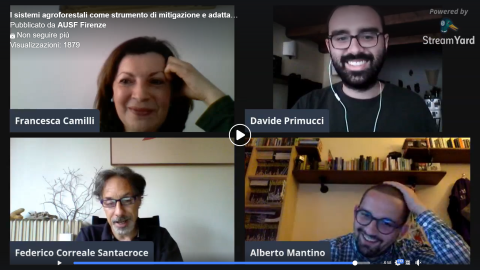Report by Francesca Camilli
The University Forest Students Association of Florence (AUSF-Firenze), member of the International Forestry Student Association, were willing to organise a seminar about Agroforestry at the University of Florence in preparation for the EURAF 2020 (originally scheduled in May, then postponed to October because of the Covid-19 pandemic); on May 13th, 2020, despite lockdown measures in Italy, the initiative took place as part of the online cycle of conferences named “#Ausfinrete” (literally, Ausf in network)
organized by AUSF-Italia.
Why a webinar on Agroforestry? As the EURAF Conference will be organised in Italy, we take advantage of the event to spread a subject which is underrated through the Italian university courses programs. Besides a few commendable exceptions, Agroforestry is poorly studied: for instance, we noticed that a fair number of graduated students on Agricultural or Forestry Sciences have never studied agroforestry systems.
Therefore, the purpose of the webinar was not just an introduction to Agroforestry but also a way to spread interest in the topic amongst our audience mainly made of university students. Despite the event was forced to be online, it turned into a very participated and successful event collecting about 1800 views on the Facebook page of AUSF-Firenze.
The webinar mainly focused on the correlations between Agroforestry and the issues related to climate change. The “Effort Sharing 2021–2030” (Regulation EU 2018/842), in line with the COP21 Paris Agreement refers also to agricultural practices in order either reducing greenhouse gas emissions or balancing with an equal amount of GHG sequestration. Since Agroforestry has been widely recognised by scholars and professionals as an agricultural practice with a significant potential to mitigate and adapt to
climate change at the European scale, we support the training of the younger generations of agronomists and foresters to design agroforestry systems as solutions to face the future environmental challenges.












